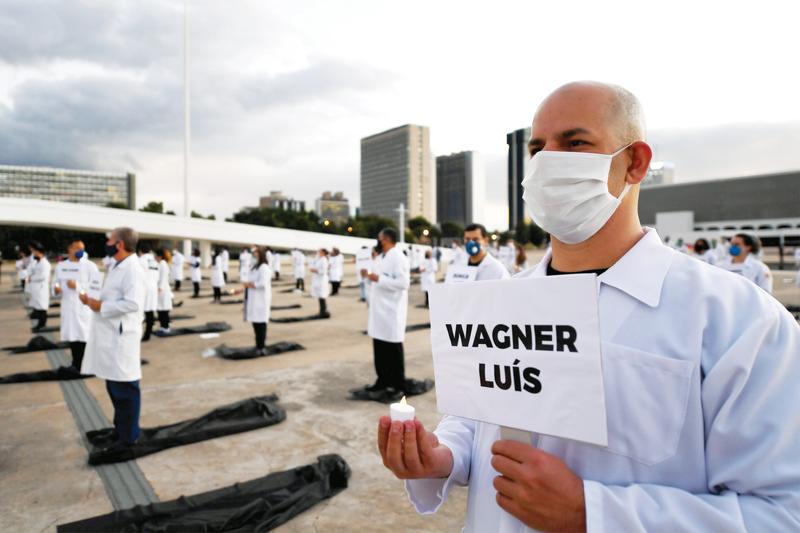Brazil overtakes France to become sixth worst-hit nation
 Nurses honor health workers who have died of the COVID-19, in Brasilia, Brazil, on May 12. (EVARISTO SA /AGENCE FRANCE-PRESSE)
Nurses honor health workers who have died of the COVID-19, in Brasilia, Brazil, on May 12. (EVARISTO SA /AGENCE FRANCE-PRESSE)
The 73rd World Health Assembly, or WHA, next week will not only focus on how to defeat the COVID-19 pandemic, but also on how the world can build stronger health systems, the World Health Organization said.
The WHA will be held on May 18-19 as a virtual conference and with a shorter schedule. As the WHO’s decision-making body, the WHA is attended by delegations from all WHO member states to determine the policies of the organization, appoint its director-general, supervise financial policies and review and approve the proposed program budget.
WHO Director-General Tedros Adhanom Ghebreyesus said the novel coronavirus outbreak has been an unprecedented shock to the world.
But he emphasized that through national unity and global solidarity the world can save both lives and livelihoods, and ensure that other health services for neglected diseases, child vaccination, HIV, tuberculosis and malaria continue to both function and improve.
“During the World Health Assembly next week, we will discuss with health leaders from across the world not only how to defeat COVID-19 but also how we can build back stronger health systems everywhere,” he told a virtual news conference from Geneva on May 13.
“We have a once-in-a-lifetime opportunity to prove that the world is more than just a collection of individual countries with colorful flags.”
He said the pandemic has made it crystal clear that “we are one world that has more in common with each other than we’d ever dare to believe”.
Tedros pointed out that the best defense against disease outbreaks and other health threats is preparedness, which includes investing in building strong health systems and primary healthcare, and called these two sides of the same coin.
“We have a new virus entering the human population for the first time, and therefore it is very hard to predict when we will prevail over it.” Michael Ryan, executive director of the WHO Health Emergencies Programme, said at the press conference in Geneva.
“I think it’s important to put this on the table: this virus may become just another endemic virus in our communities and this virus may never go away,” said Ryan. “It is important that we be realistic and I don’t think anyone can predict when or if this disease will disappear.”
He said “we may have a shot at eliminating this virus” with the help of a vaccine, but added the vaccine must then be “highly effective” and “made available to everyone” and that “we will have to use it”.
The daunting pressure of COVID-19 infections keeps increasing in some countries and continents, especially in Latin America apart from North America, though much of Europe is undergoing relaxation of restrictions.
Latin America is bracing for the peak of the pandemic this month, with stricter social distancing rules and beefed-up healthcare systems.
Brazil registered a record number of new cases of the novel coronavirus on May 13, surpassing France’s tally to become the sixth worst-hit country, as the disease sends the economy toward its worst year since at least 1900.
The government confirmed 11,385 new cases in the last 24 hours, bringing its total count to 188,974 cases of the coronavirus since the outbreak began. Early on May 13, France revised its total number of confirmed and suspected cases down 0.3 percent to 177,700.
The pandemic has battered Brazil’s economy as residents shelter at home, and many state and local governments instructed most businesses to close in order to slow the spread of the virus.
On May 13, the economy ministry predicted the Brazilian economy would contract 4.7 percent in 2020, the biggest annual fall since records began more than a century ago.
The ministry estimates every additional week of quarantine measures costs the economy 20 billion reais (US$3.4 billion).
The five countries that have registered more infections than Brazil are the United States, Spain, Russia, the United Kingdom and Italy.
Brazil recorded 749 new deaths from coronavirus on May 13, bringing the overall toll to 13,149.
As European Union member states continue to ease COVID-19 lockdown restrictions imposed two months ago, concerns about the risks of a second wave of infections have increased.
In Belgium, after all shops were allowed to reopen on May 11, long lines were seen outside fast fashion and retail shops in Brussels. In the Rue des Tongres shopping area, many people walking on the narrow sidewalks and into the stores were not wearing masks.
“It is not very encouraging for a second phase,” Belgian Health Minister Maggie De Block said of the latest easing of lockdown measures, as she watched images of lines forming on the morning of May 11 in front of large commercial signs, according to The Brussels Times.
Other EU member states, such as Italy, Spain, France and Germany, have also taken more measures to lift restrictions by opening stores and resuming classes.
Germany, which has been widely viewed as effective in flattening and crushing the curve of infections, has already witnessed a resurgence after Chancellor Angela Merkel said on May 6 that the country could gradually return to normal.
Xinhua contributed to the report.


